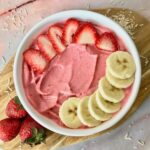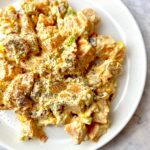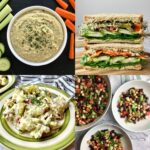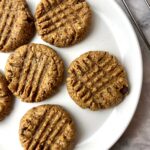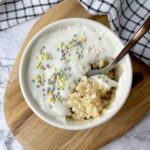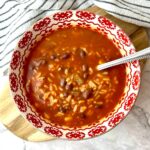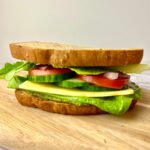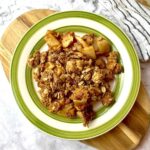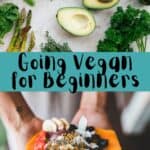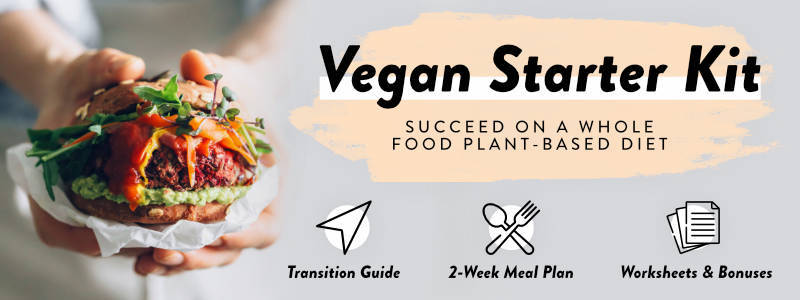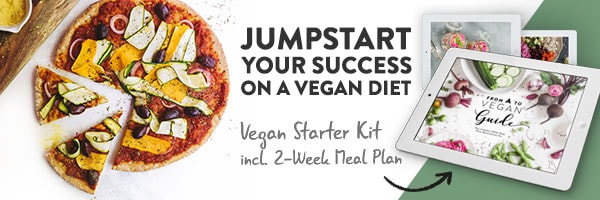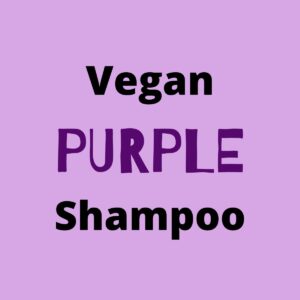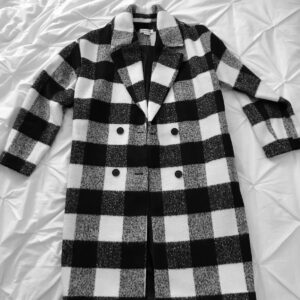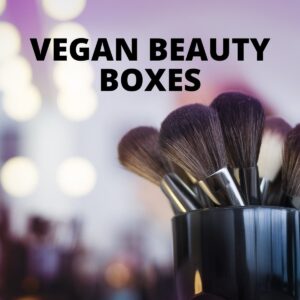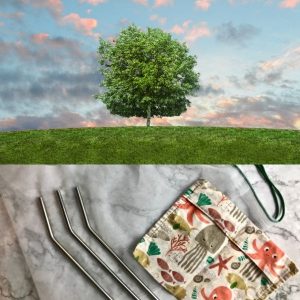This post contains affiliate links for which I may earn a commission (at no extra cost to you) should you make a purchase. As an Amazon Associate I earn from qualifying purchases. Please see my disclaimer for more information.
Going vegan can be challenging at first because there is so much to learn and so many changes that you need to make. This guide will help any vegan beginners start out on the right foot!
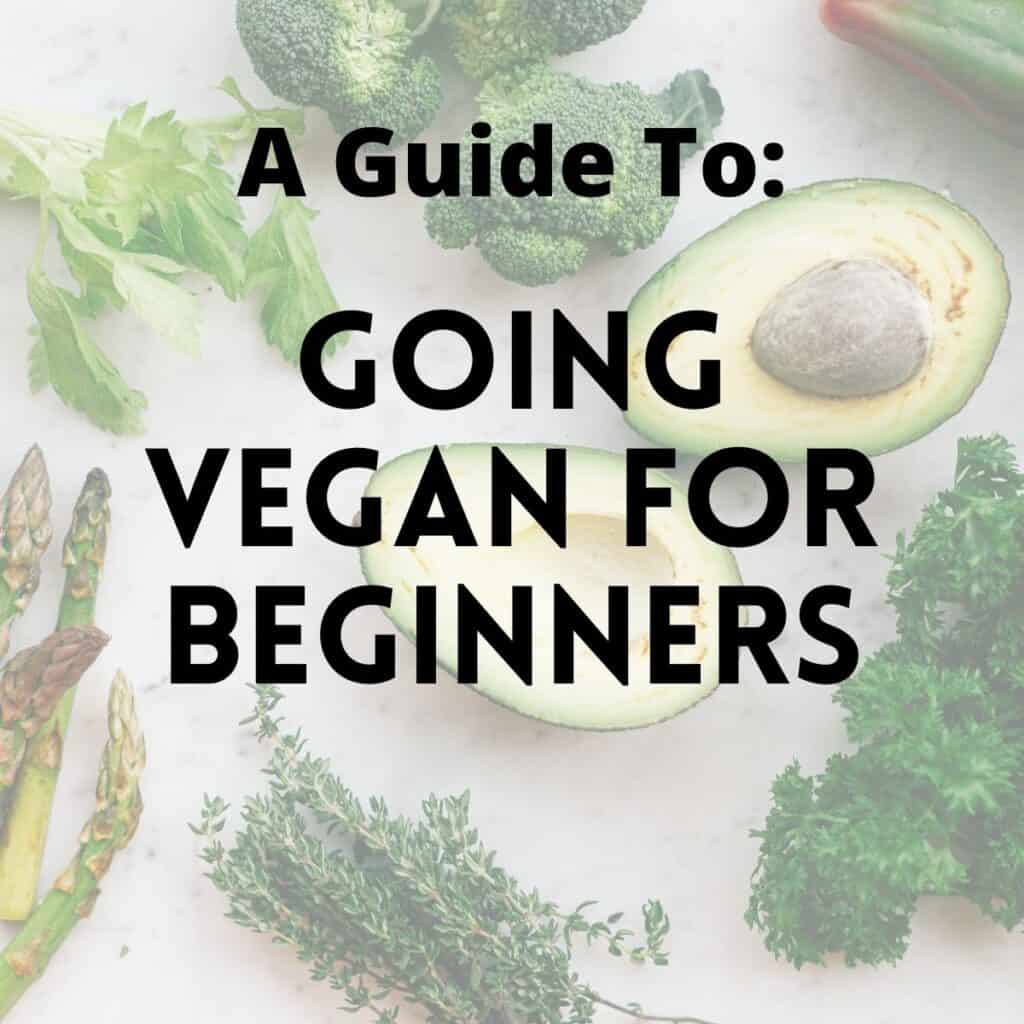
What does vegan mean?
First, let’s go over what being vegan actually means. Many people think that veganism is only food related, but it is so much more than that!
Veganism is a lifestyle that excludes, as much as possible, animal cruelty and exploitation. This means not eating anything that contains ingredients from animals, but it also includes not purchasing any other items that contain animal products or that were tested on animals. This includes only buying vegan clothes, beauty products, personal care products, etc.
That’s why there is really no such thing as different types of vegans such as ethical vegans, environmental vegans, and health vegans. There are various benefits to veganism, but being truly vegan comes from a desire to eliminate animal cruelty and exploitation. So every vegan is doing it for ethical reasons, which is why we don’t need to call them ethical vegans. That’s the only kind! This differs from being plant-based, which refers only to diet. Many people go plant-based for primarily health or environmental reasons, and that's awesome too!
Many beginners find going vegan daunting because changing your diet is hard enough, never mind looking into every single item you buy to make sure it's vegan. That’s why many people focus on just eating a plant-based diet and not being fully vegan, which is still fantastic! I think it’s great if anyone attempts to eliminate animal products from their diet or life, even if the changes are small. If you aren’t ready to go completely vegan, I think you will still find some helpful information in this article.
Why should you go vegan?
Going completely vegan is primarily for the animals, but there are other benefits that may make you consider veganism!
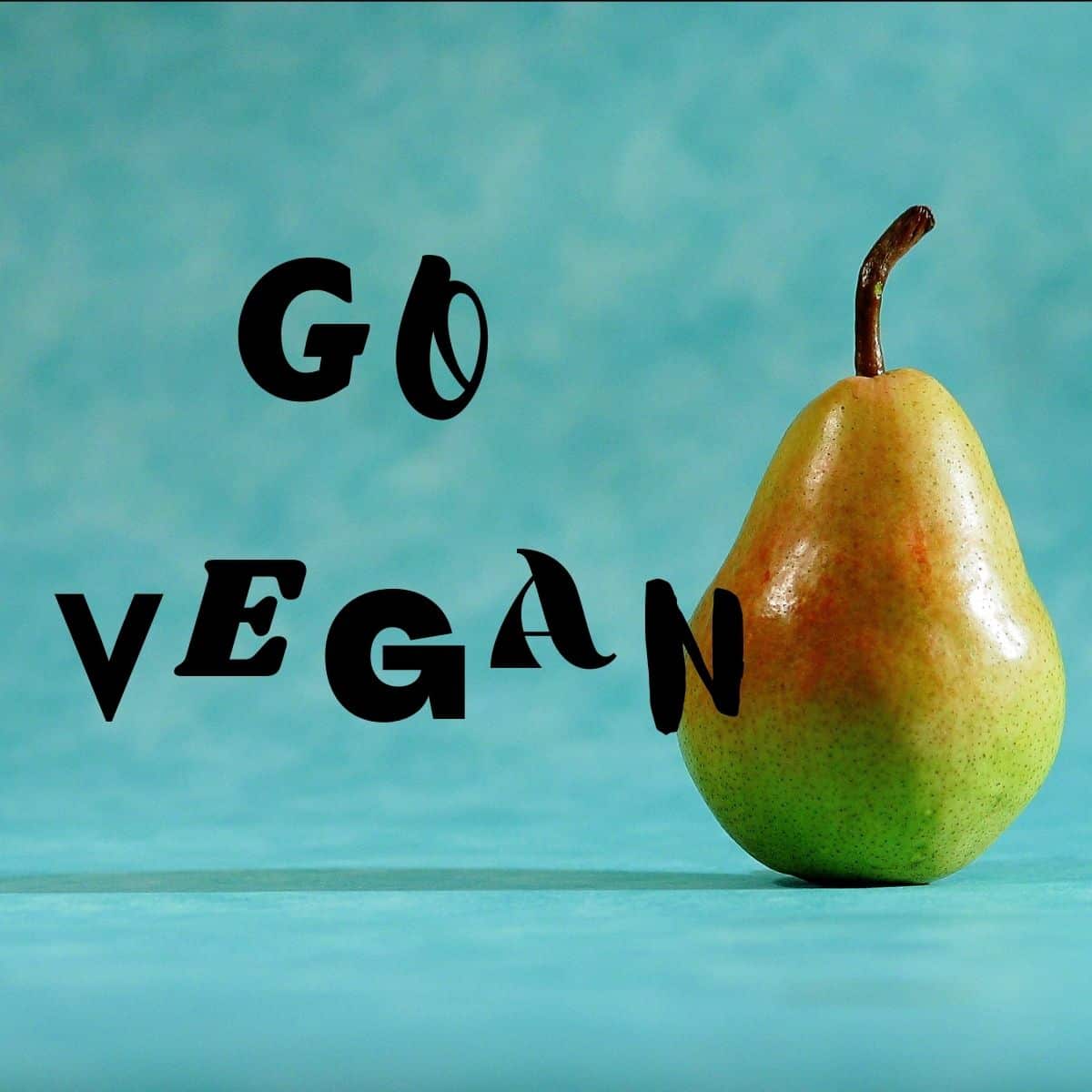
For the animals
When you go vegan, you are reducing the number of animals that are being harmed and exploited. It may not seem like one person is making a difference, but you are!
For the planet
Animal agriculture uses more water and produces more greenhouse gases than the production of plant foods. I’m no expert on this topic, but you can read about even more ways that veganism can have a positive impact on our planet here.
For your health
A common misconception is that all vegans are healthy. While eliminating meat and dairy can improve your health, there are plenty of unhealthy vegan processed foods out there. These are great for people who are transitioning and for treats every once in a while, but they aren’t health-promoting. Some people will even gain weight when they are vegan because they are eating too much of the packaged vegan meat and cheese alternatives. Check out this article about how to lose weight on a vegan diet to avoid this.
The health benefits of veganism come from eating a mostly whole foods plant-based diet which eliminates not only animal products, but also processed foods including oil and sugar.
Eating a whole foods plant-based (WFPB) diet has been proven to prevent and reverse various illnesses and chronic conditions including diabetes, heart disease, and obesity. Several notable plant-based doctors have written books to explain the health benefits of eating WFPB. You can check out some of those plant-based diet books here.
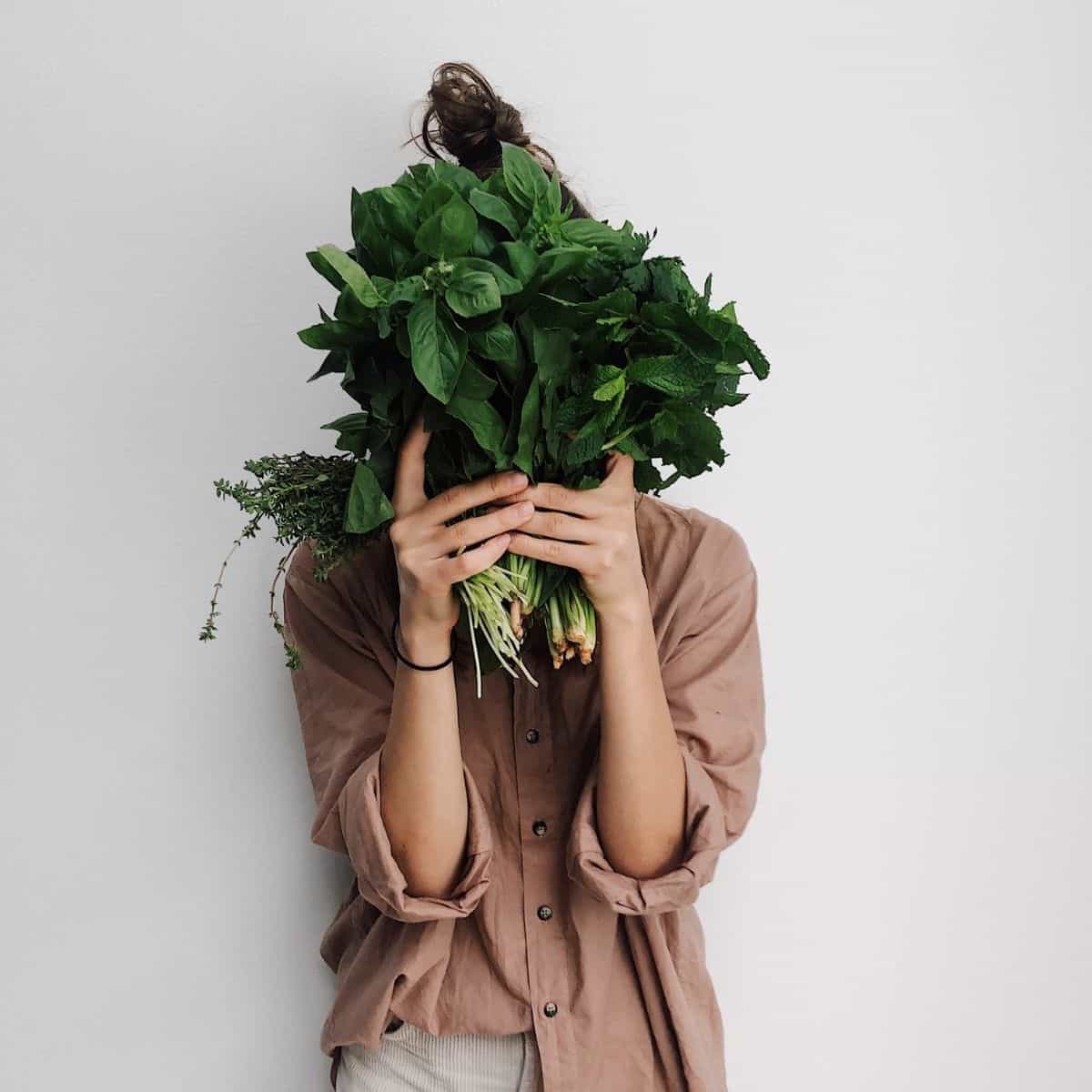
Top tips for going vegan
As mentioned, going vegan for beginners is challenging. Here are some tips to keep in mind while you transition to veganism:
- Don’t worry about what other people think. Veganism is becoming more and more popular, but some people still think it's extreme and/or unhealthy. Some people may make fun of your decision, while others may be concerned that you aren't going to be getting all the nutrients you need. You can try to explain your decision to them, but I find it easiest to not argue, and just try to block out any negativity. You know that you are doing what you want to do, and that's what matters.
- Stock your pantry. Once you know what food items you can eat as a vegan, it's a good idea to stock up on plenty of vegan foods so that you always have food available when you're hungry. If you are fully committed, you may even want to get rid of the non-vegan foods you have. If you choose to do this, I recommend giving it away to friends or family members so that you don't waste any food. If you live with someone who isn't vegan, it may be more challenging for you, but if you have all your vegan food stocked, it will be easier to stick with it.
- Plan your meals. Some people do just fine without planning their meals, but in the beginning, this could really help you stay on track. Even just writing down a rough idea of what you're going to eat would be helpful. For example, tofu scramble for breakfast, collard wraps for lunch, veggies and hummus for a snack, and chickpea curry for dinner. Then you can buy everything you need at the beginning of each week and batch cook some meals.
- Don’t be too hard on yourself. If you do happen to get off track and eat some non-vegan food, don't beat yourself up. Many people who are vegan now, tried going vegan and failed at some point.
- Read up on plant-based nutrition. A lot of people dive into being vegan without knowing what nutrients they need and what supplements they should take. It you aren't eating well-rounded meals, you could end up with deficiencies no matter what kind of diet you eat.
- Get blood work done so you know what to supplement. A lot of people wonder what supplements they should take when they are vegan. You will likely need a B12 supplement, but you won't know if you need anything else unless you get blood work done. If you have any deficiencies, start taking supplements and get your blood checked again in 3 months or so, to ensure that the supplements are working.
- Watch a documentary when you lose motivation. Even though you're probably going vegan because you care about animal well-being, you may lose motivation at some point. Maybe you'll have some non-vegan cravings, or you'll really want to buy those leather shoes. When this happens, it may help to watch some documentaries to remind yourself of why you started this in the first place. Some of my favorites are: Forks Over Knives, What The Health, Cowspiracy, and Earthlings.
How to start a vegan diet
If you want an easy to follow guide with recipes and a 14-day meal plan full of healthy whole foods plant-based recipes, check out this Vegan Starter Kit.
What foods can vegans not eat?
Vegans don’t eat any animal products, which means no meat, dairy or eggs. There are also a bunch of ingredients that you may not be familiar with that are derived from animals. This is where it can get tricky because you might not recognize these ingredients when you are looking at packaged foods. That’s why it’s easiest to buy things labeled as vegan when it comes to packaged items.
Any time you buy a packaged item from the store such as chips, salad dressing, cookies, bread, etc., you will have to check to see if it’s vegan. These items all come in vegan and non-vegan versions. It’s super easy if something says, “Vegan,” right on the package, but if it doesn’t, check the ingredients list.
Here is a list of foods and ingredients to avoid:
- Milk
- Butter
- Mayonnaise
- Ice cream
- Yogurt
- Cheese
- Eggs
- Meat
- Poultry
- Fish or any seafood
- Honey
- Gelatin
- Whey
- Casein
- Shellac
- Carmine
- Vitamin D3 (can come from a vegan source, but it often comes from lanolin)
- Natural flavour (this could be vegan, but you would likely have to contact the company that makes the product to be 100% sure, if the product isn’t labeled as vegan)
- Sugar (this is sometimes processed with bone char, but organic sugar is vegan)
This is not an exhaustive list, but it covers the most common animal foods and ingredients. If you are checking the ingredients list of a package and it has a bunch of ingredients you are unsure about, a quick online search will usually give you an answer about whether or not a specific ingredient or product is vegan.
What foods can vegans eat?
Check out this plant-based grocery list for a list of healthy whole foods that you can buy when you're vegan.
You can eat:
- Vegetables
- Fruits
- Grains
- Legumes
- Nuts
- Seeds
- Plant-based milks
- Cheese alternatives
- Meat alternatives
- Any other packaged items that are vegan
There are also vegan alternatives for pretty much any non-vegan food you can think of! Some of these can be made at home using healthy ingredients, and some are store-bought processed junk foods. I think it’s okay to have the vegan junk food in moderation, especially if that’s what helps you stay on track with being vegan!
An easy way to put together a healthy meal is to start with a base of grains such as brown rice or quinoa, then add beans and vegetables of choice. Add salsa, guacamole, or dressing for more flavour. There are so many recipes out there to help you get started!
Do vegans get enough protein?
A common concern for vegan beginners is whether or not you will be able to consume enough protein without eating any meat. Rest assured, it is definitely possible to get enough protein from plant-based foods.
How much protein you need depends on many individual factors, but there are several high-protein plant-based foods to help you reach your daily protein goals. If you need extra protein for working out or any health reasons, you can always supplement with some vegan protein powder.
Protein can be found in any plant-based foods you eat, but here are some of the higher plant-based protein sources:
Vegan protein sources:
- Lentils
- Chickpeas
- Other beans
- Tofu
- Tempeh
- Edamame
- Seitan
- Hemp seeds
- Chia seeds
- Flax seeds
- Nut butters
- Brown rice
- Quinoa
- Barley
- Oats
You can also get high amounts of protein from certain packaged vegan foods such as vegan burgers, sausages, and other “fake meats.” I recommend that you enjoy these sparingly, as they are not very healthy. So have them sometimes, but don’t rely on them as an everyday protein source.
Vegan protein powders:
- Garden of Life Raw Organic Protein - Vanilla
- Vegansmart All-In-One Nutritional Shake - Chocolate
- Naked Pea Protein Powder
- PlantFusion Complete Protein
- Orgain Organic Plant-Based Protein Powder - Vanilla Bean
Is vegan food healthy?
As mentioned above, vegan food can be healthy or unhealthy. If you are focusing on more of a whole foods plant-based diet, I would consider that very healthy. That would mean eating unprocessed or very minimally process foods. This eliminates refined sugar and oils.
If you choose to eat a lot of processed packaged foods such as fake meats and cheeses, that isn’t very healthy, but indulging sometimes is totally okay!
I choose to eat mostly whole foods plant-based, but I allow myself to eat vegan packaged foods every so often as a treat! Do what works for you, but keep in mind that if you focus mostly on eating processed vegan junk food, you likely won’t feel your best. I think it’s all about balance. Don’t forget to eat real foods such as fruits, vegetables, grains, beans, nuts, and seeds!
You can check out a healthy plant-based grocery list here.
To get started with a healthy vegan diet, you can check out this Vegan Starter Kit, which includes a 14-day meal plan.
Do vegans need to take supplements?
Vegans can get most of the necessary vitamins and minerals through foods if they are eating a well-balanced diet. However, some supplements may be necessary for you.
I recommend that you get blood work done regularly to check your levels of certain vitamins and minerals. That way you will know exactly what you need to eat more of or supplement if you struggle to get it through food. Everyone is different and some people absorb less than others, so what someone else might be able to get through food, you may need to supplement.
Getting your blood tested is the only way to know for sure what YOU need. And if you do buy supplements, always check the amount of vitamin or mineral per serving. For example some people may need to supplement 25 mg of iron per day, while someone else may need 100 mg per day to get up to a normal range.
Here are some common supplements that vegans take:
B12
Most vegans need to take a B12 supplement. Some foods are fortified with B12, such as certain brands of nutritional yeast and plant-based milks, however it is difficult to get enough B12 from fortified foods.
Vegan B12 Supplements:
- Live Well Maximum Strength Vegan B12
- Naturelo Vegan B12 Infused with Spirulina
- Lunaki Methyl B12 Gummies
Vitamin D3
It is difficult to get enough vitamin D through foods, whether you are vegan or not. A lot of people are deficient in vitamin D and have no idea, which is why I recommend getting a blood test to see if you need more, and also to find out how much you need. You may get enough vitamin D from the sun if you live in a sunny climate, but it’s good to check just in case. Keep in mind that most vitamin D3 pills are not vegan, so make sure you check the bottle to see if it is vegan.
Vegan D3 Supplements:
- Doctor's Best Vegan D3
- Naturelo Vitamin D3
- Garden of Life mykind Organics Vegan D3
- Mary Ruth's Vitamin D3 Gummies
Omega-3 fatty acids
There are three essential types of omega-3 fatty acids: ALA, EPA, and DHA. ALA can be obtained through several plant-based foods such as walnuts, chia seeds, flax seeds and hemp seeds.
ALA is converted into EPA and DHA in the body, but the conversion rate is low and many people will need to supplement EPA and DHA in order to get enough.
Vegan Omega-3 Supplements:
- Sapling Vegan Omega-3
- Ovega-3 Plant-Based Omega-3
- Amala Vegan Omega-3
- Nature's Way NutraVege Omega-3 Plant
Iron
You can get plenty of iron on a plant-based diet, but many people are iron-deficient even on an omnivore diet, so it’s a good idea to get your iron checked in a blood test.
Even though you will likely get plenty of iron through vegan foods, some people don’t absorb it well, so you may need to supplement. But again, you’ll have to get a blood test to know for sure. To increase the absorption of iron, consume it with foods that are high in vitamin C.
Vegan iron supplements:
- Naturelo Iron with Vitamin C
- PlantFusion Vegan Complete Iron
- Garden of Life Vitamin Code Healthy Blood, Gentle Non-Binding Iron
To ensure that you are getting adequate amounts of certain vitamins and minerals, you may want to take a daily multivitamin.
Vegan multivitamins:
- DEVA Vegan Multivitamin and Mineral Supplement
- Garden of Life mykind Organics Women's Multi
- Mary Ruth's Liquid Morning Multivitamin
- Naturelo One Daily Multivitamin for Women
How to start a vegan lifestyle
Often, the biggest change a person makes when going vegan is what they eat. But there is more to it than that if you want to be completely vegan. This entails making sure everything you buy and use is free of animal products and is cruelty-free.
Now, I think it would be impossible for anyone to avoid animal products in every item 100% of the time. Do your best, within reason. For example, vaccines aren’t vegan, but if you choose to get vaccinated to protect yourself and others, that doesn’t mean you aren’t vegan.
It’s also fine if you choose to continue using and wearing non-vegan clothing and products that you purchased before making the decision to go vegan. For example, if you bought a pair of leather shoes a year ago and they are still in great condition, wear them if you want to. Some vegans will choose not to wear them, but it’s okay if you do. What’s more important is focusing on no longer buying leather shoes from this point forward.
Vegan apparel
People who are vegan do their best to avoid animal-derived fabrics and materials. Some of the most common materials to avoid are:
- Wool
- Silk
- Fur
- Leather
- Cashmere
- Down
- Suede
Here are some vegan clothing companies:
Something that a lot of people don’t realize is that many shoes are also not vegan! They are often made with animal-based materials, and even the glue holding the shoes together is often from animals. If you are looking for some vegan shoes, check out this list of 100% vegan shoe brands.
Vegan household cleaning products
Here are some of my favorite vegan cleaning products:
- Mrs. Meyer's Clean Day Multi-Surface Everyday Cleaner
- Seventh Generation Clementine Zest & Lemongrass Dish Liquid
- Biokleen Laundry Liquid
Vegan personal care products
Here are some of my favorite vegan body washes:



Here are some of my favourite vegan skin care products:




Lush and The Body Shop also have a lot of great vegan selections, but not all of their products are vegan, so make sure you check the labels.
Vegan makeup
There are a lot of makeup companies that are 100% cruelty-free today, but not a lot of the bigger companies are completely vegan. They often have several vegan products though, so you can check labels on cruelty-free makeup to ensure they are vegan!
Here are some of my favorite makeup brands that are 100% vegan:
I hope the information provided here will help you on your vegan journey!


